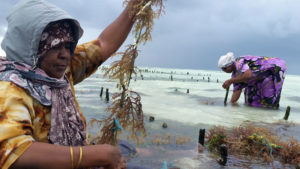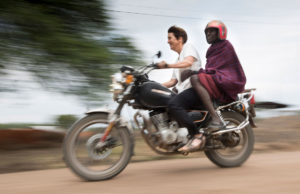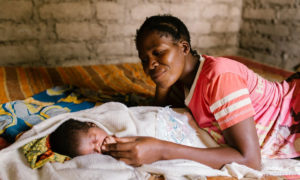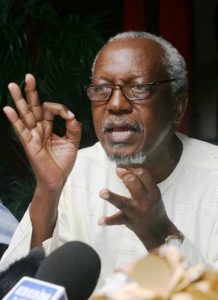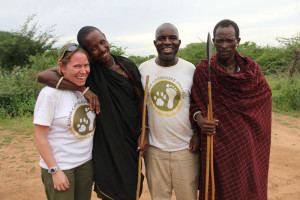compiled by Donovan McGrath
[Hong Kong] Government pledges bill outlawing local ivory trade
This piece published in the South China Morning Post explains the efforts in Hong Kong to outlaw the local ivory trade which affects wildlife in Africa, especially Tanzania. Extract: The government aims to submit a bill kick-starting efforts to outlaw the local ivory trade this year and insisted it was not stalling, contrary to concerns voiced by lawmakers and wildlife campaigners. At a Legislative Council environmental panel . . . wildlife campaigner and pro-Beijing lawmaker Elizabeth Quat pushed the government for concrete details. Environment undersecretary Christine Loh Kung-wai told the panel: “I don’t want to give you the impression that we are stalling, but at the present stage it is difficult for us to make an estimate. But within this year we can submit this bill, and the council can pass the bill into law.” . . . Her response raised concerns the administration was dragging its feet. . . Alex Hofford, wildlife campaigner at WildAid Hong Kong, said the government appeared serious about its plans, but added: “We would like to see them set a concrete timeline with actual dates.” . . . (published 23 February 2016) – Thank you Richard Wong for this item
How ‘Ivory Queen’ was trapped using technology
Towards the end of 2015 and the beginning of 2016, The East African newspaper in Kenya published a variety of articles on the politics, art, culture, economy and environment of Tanzania. Our selected items begin with the following piece which looks at how Tanzanian law enforcement used technology to catch criminals in the illegal trade of ivory. Extract: One day in October last year, agents from a Tanzanian crime unit raced past Dar es Salaam’s Palm Beach Hotel in pursuit of the suspected leader of a global elephant poaching ring. The chase was the result of new breakthroughs in Tanzania’s fight against an increasingly rapacious poaching trade, which has felled 60 per cent of the country’s elephant population in the past five years. The agents’ target that day was Yang Feng Glan, a 66-year-old Chinese national dubbed the “Ivory Queen,” who is accused of running a smuggling empire stretching from the game parks of Tanzania to the clandestine ivory markets of Asia. . . A Tanzanian court in October charged Ms Yang with heading a criminal network responsible for smuggling out 706 pieces of ivory worth Tsh5.44 billion ($2.51 million) between 2000 and 2014. . . The new techniques follow work done in neighbouring Kenya, where poaching rates have nosedived. In both countries, the police have started concentrating on the poachers’ own technology – guns and phones – and using it against them. . . The history of a suspect’s gun, the phone calls he or she makes, and the money they move, create a trail of evidence. . .
The capture of Ms Yang started with a tip-off in 2014. . . [L]ocal informants pointed crime squad agents towards Manase Philemon, a suspected Tanzanian ivory dealer who was barely literate but could mysteriously speak Chinese. Under interrogation, Mr Philemon fingered Ms Yang, who police believe taught him Mandarin. . . After Mr Philemon’s tip-off, she became the [National and Transnational Serious Crimes Investigation Unit]’s top target. . . They called it “follow the gun, save the elephant.” Immediately after a suspect is captured, the agents focus on the suspect’s weapon. Tracing how the poacher obtained that gun leads to the person one level above in the syndicate, and points in the directions of a team. . . But just as they began building a case against Ms Yang, she vanished. . . Ms Yang fled to Uganda . . . More than a year later, her phone revealed where she was. . . NTSCIU is able to pull up poachers’ phone numbers and call histories . . . Computer software is used to delineate links between on-the-ground poachers, dealers and transnational criminal gangs. A server flags to NTSCIU mobile phone numbers when they become active, but does not record calls. . . Mobile phones also help agents follow the money. Many Africans send and receive money via their phones. That means agents who monitor phone calls can also track payments, helping to build a picture of who is involved. . . It was thanks to Ms Yang’s phone that about a year after she had left for Uganda, Tanzanian agents discovered she was back in Dar es Salaam. . . (published 27 February – 4 March 2016)
Rare pink diamond discovered in Tanzania
This next item from The East African (Kenya) is short and is reproduced almost in full here: Petra Diamonds Ltd has recovered a 23.16 carat pink diamond of exceptional colour and clarity from Williamson mine in Shinyanga province in northern Tanzania. Petra said the diamond will . . . be offered for sale by appointment at Antwerp in Belgium. Pink diamonds found only in a handful of mines globally, are highly coveted. The Williamson open pit mine is Tanzania’s sole producer of diamonds and is based on the 146 hectare Mwadui kimberlite pipe. (published 19-25 December 2015)
COP21: Youth cycle around Africa for a ‘fair deal’ in France
Special Correspondent Zeynab Wandati writes for The East African (Kenya) -Extract: “I get so much joy from cycling; I get to be me and one with the earth,” said Godfrey Mwagema, the president of the Association of Cyclists in Tanzania. . . The idea is to put pressure on national and world leaders to deliver on climate justice and commit towards keeping global emissions below 2°C. Low carbon emissions are a key part of international negotiations on climate change. The Tanzanian team had been cycling for 15 days, from the Tanzania-Malawi border to Namanga, covering a total of 1,640 kilometres. . . Esther Joshua, the only female in the Tanzanian team, said that she was motivated to join the campaign in order to encourage people to find alternative forms of energy other than charcoal. “In Tanzania, people are cutting down trees in order to burn charcoal. We are telling them to use gas instead . . .” (published 28 November – 4 December 2015)
Illustrations by Dar artists highlight causes
This item in The East African (Kenya) included a cartoon illustration the foreign mining agent mentioned in the short piece. Extract: The exhibition in Vipaji Gallery in Dar es Salaam, titled Domo-Cartoon and curated by Gadi Ramathan featured works by illustrators and the pieces highlight certain causes. An illustration by Said Michael depicts a foreign mining agent, hacking away at the bottom of a cliff and filling bags with precious minerals. Meanwhile, on top of the now perilous undercut cliff, are villagers in their humble dwellings. His work represents the sentiments of those living near mines, who are accusing mining companies of displacing them from their ancestral homes, and work is part of a campaign against land grabbing in the country. . . The exhibition had works of acrylic on canvas, showcasing nostalgic silhouettes of fast disappearing trees native to the Tanzanian coast such as the Mnazi, the common tropical palm tree (cocos nucifera). . . (published 20-26 February 2016)
Off Grid Electric lights a path for Tanzanians
From the Financial Times (UK). Extract: You could call it a lightbulb moment. Eric Mackey had relocated from the US after graduating from the University of California, Los Angeles with a degree in ecology and evolutionary biology, to work with an aid agency in east Africa helping to set up mobile clinics and train rural health workers. Upon arrival in Tanzania, however, it was obvious the most pressing need among local people was cheap, reliable electricity. Most Tanzanian homes are lit using kerosene lamps, generating fumes that are as damaging as smoking two packets of cigarettes a day. Families often store this fuel on the floor in fizzy drink bottles, which creates a further risk of someone accidentally scorching their internal organs by taking a toxic drink from the containers. “It seemed unfathomable that millions of people live like this,” Ms Mackey recalls, adding that she felt it was “incredibly unfair” that some of the world’s poorest people pay the most for the dirtiest energy. The irony is that east Africa has an abundance of the most powerful energy source available to us: the sun. With modern technology its power could be harnessed at a much lower cost than liquid fuels, Ms Mackey reasoned, so she sought out a Masters programme where she could develop a business plan. . . Ms Mackey met Xavier Helgesen [at Oxford’s Saïd Business School] and they started building a solar energy business, Off Grid Electric. “He was a talented entrepreneur, eager to start focusing his attention on energy in Africa,” Ms Mackey says of her co-founder. “I knew how to make ideas work there.” They quickly brought in a third partner, Joshua Pierce, who knew something about building energy systems and became chief technology officer. . . Off Grid Electric now provides affordable solar power to low-income communities in Tanzania, and raised $70m in 2015 in order to extend their reach to a million customers in the country. The company employs more than 800 people full time, primarily in sales and regional service teams, who travel door-to-door in rural Tanzania and Rwanda to connect and maintain the solar energy equipment. These teams are now installing more than 10,000 solar units in homes and businesses every month. The goal, over the next three years, is to create 15,000 jobs across east Africa. . . (published 4 April 2016) -Thanks to Jerry Jones for this item – Editor
In Tanzania, a Horrific Fishing Tactic Destroys All Sea Life
At the end of 2015, America’s National Geographic magazine published an eight-page article, produced by its Special Investigations Unit, which focuses on wildlife crime, on the dangerous fishing methods employed by some Tanzanian fishermen. Extract: . . . Strewn in the shallows of the Indian Ocean lie shards of dead coral reefs. Why? Because poor Tanzanian fishermen are using explosives, illegally, to kill hundreds of fish in seconds. Blast fishing . . . not only destroys large numbers of fish directly – but indirectly as well by killing coral and the rich array of marine animals that depend on it. Experts believe that in Tanzania, blast fishing is occurring at unprecedented rates, in part because a boom in mining and construction has made it easier for people to get their hands on dynamite. Bottle bombs made with kerosene and fertilizer are also used.
. . Blast fishing in Tanzania dates back to the 1960s and was outlawed in 1970. Cheaper and vastly more productive than traditional methods, such as basket traps and hook and line, it’s also dangerous: Errant blasts can shatter limbs, even kill people. Tossed overboard, one bottle bomb can kill everything within 30 to 100 feet of the blast. The explosion can rupture a fish’s swim bladder, the organ that gives it buoyancy. Most of the dead fish sink, but fishermen are ready with nets to scoop up those that float on the surface.”With numerous blasts occurring daily on reefs all over the country over a period of several decades,” Greg Wagner, of the University of Dar es Salaam in Tanzania, wrote in a 2004 study, “the overall impact of dynamite fishing on coral reefs in Tanzania has been devastating.” It was European armies during World War I that introduced dynamite fishing as a way to catch a quick, fresh meal, according to marine expert Michel Bariche. Some countries, such as Kenya and Mozambique, have succeeded in shutting it down, but it still goes on in Lebanon, Malaysia, the Philippines, Indonesia, and Myanmar, among others. Tanzania is the only country in Africa where blast fishing still occurs on a large scale, says SmartFish, a fisheries program funded by the European Union. . . (Sourced online 30 December 2015)
Tanzania loves its new anti-corruption president. Why is he shutting down media outlets?
This is an interesting piece by The Washington Post (USA). Extract: Tanzania’s President John Pombe Magufuli strode into office in November promising to reduce corruption, cut wasteful spending and improve public services. These initiatives are welcome in the East African nation, which, while seen as a bastion of political stability in an at-times volatile region, consistently ranks low on human development and high on graft. But Magufuli’s government imposed new restrictions on the media recently, and brought that commitment into question. Magufuli’s popularity ballooned when he cancelled expensive independence-day celebrations in December and instead encouraged citizens to come together and clean the streets. There’ve been media bans in Tanzania before – but many expected better from Magufuli. The first move came on Jan. 15, when Nape Nnauye, Tanzania’s new information minister, announced a permanent ban on the printed weekly Mawio ( a Kiswahili-language newspaper). The government banned Mawio for “inflammatory” reporting. Its publisher and managing editor said the ban shows the government can’t bear criticism. Days later, the Tanzania Communications Regulatory Authority (TCRA) – the agency that regulates the country’s communications and broadcasting sectors – announced a three-month suspension of six television and 21 radio stations if they failed to pay license fees. Within a day of TCRA’s announcement, 15 of the 20 radio stations and one of the six television stations had paid their required dues. Civil society activists in the country cried foul, saying the suspensions of those that did not pay infringed on the public’s right to information. There’s a widespread feeling that Tanzania’s government often applies rules and regulations selectively, upping enforcement primarily when it feels threatened. . . . There’s some reason to conclude that the government is shutting down broadcasting because it wants to ban criticism. . . Magufuli’s government could be protecting against further erosion of public support for the ruling party, Chama cha Mapinduzi (CCM), which has dominated Tanzanian politics since independence in 1961. . . The current Mawio ban smacks of politics. The “inflammatory” articles were about the ongoing stalemate in semi-autonomous Zanzibar, where poll results were nullified after accusations of “irregularities” – including apparent victory for the main opposition party. . . (Sourced online 25 January 2016)
Why CCM should shun racists for the sake of democracy in Zanzibar
This article by Fatma A Karume first appeared in Habari, a journal produced by SVETAN – the Sweden-Tanzania Association. Extract: . . . At the age of 10, my great grandmother, Bi Amani, was kidnapped from her village in Central Africa by slavers and survived the walk across the continent and the dhow journey from Bagamoyo to Zanzibar; my great-great grandfather came as a trader from Kutch Province in India; my great, great, great grandfather sailed into Zanzibar from Muscat with the aid of the ever present monsoon winds, not long after the arrival of Seyyid Said bin Sultan, the Lion of Oman; and further still, my great, great, great, great, great . . . great grandfather sailed into Zanzibar from Persia. I am no different from thousands of ‘Waswahili’. . . [A]nd yet . . . members of the CCM youth league, UVCCM, had the audacity to tell us that we are not welcome in Zanzibar. . . [M]embers of the CCM youth wing carried two placards. Both placards informed the country and the world at large that people of mixed race, who they referred to in a derogatory manner as ‘machotara’, are not welcomed in Zanzibar because we are apparently servants of the Sultan, while, according to their views, Zanzibar is for Africans only. . . Daniel Chongolo, the CCM Acting Head of Publicity and Ideology, had the decency and honour to issue an unreserved apology on behalf of CCM for the discriminatory placards displayed by the CCM youth league. On the front page of the ‘Daily News’ of Thursday, January 14, 2016, the general public was informed that “CCM is working to identify and eventually take appropriate action on people behind the discriminatory poster displayed by one of its members in Zanzibar . . . and Nape Nnauye, the CCM Secretary for Ideology and Publicity, was quoted as stating, “I would like to reiterate that CCM is against all forms of segregation, and this is known all over the world. It is unfortunate that the party is taking the blame for the wrongs committed by just a small number of our supporters.” . . . I suggest that CCM takes a good look at itself and starts cleaning up the racist fringes of the party for everyone’s sake, and, most of all, for the sake of democracy in Zanzibar because, believe it or not, we need to have a strong and viable CCM as a counterbalance to CUF. . . (Issue No 1/2016)
Emails Reveal How Far Clinton Was Willing to Go to Promote Ex-Ambassador’s Interests
Online news outlet Vice News published an analysis of emails released by Hillary Clinton, revealing how she was lobbied hard by former US Ambassador Joe Wilson on behalf of Symbion, an energy firm with interests in Tanzania. Extract: Wilson’s pitch to Clinton, sent on October 6, 2009 touted Symbion as a do-gooder energy company that delivered both profits and much-needed infrastructure development to developing countries. … “[We] have already begun work on a training center in Tanzania, where we will be bidding on all of the upcoming MCC financed power generation and distribution projects,” he writes.
The MCC — or Millennium Challenge Corporation — is a quasi-governmental body run out of the State Department that awards infrastructure grants to developing countries. The Secretary of State serves as the chair of the MCC board. Before Wilson got in touch with Clinton, his company had never won an MCC grant in Africa — but less than a year after his pitch, Symbion won a $47 million energy contract in Tanzania to expand and rehabilitate power distribution networks — the same contract Wilson mentioned in his email. What role, if any, Clinton played in Symbion’s obtaining the MCC contract is not clear. The MCC committee in Tanzania that made the final decision has since been dissolved, its documents are not publicly available, and the contents of Clinton’s responses to Wilson have not been made public. Clinton did attend the groundbreaking event at Symbion’s Dar es Salam plant in June, 2011 alongside Wilson’s boss Symbion CEO Paul Hinks and MCC CEO Daniel Yohannes. She didn’t mention Wilson in her remarks. (Published online, October 2, 2015)
President Magufuli didn’t ban miniskirts but….
Published on This is Africa, an online news outlet: When I saw the [Kenyan] Standard’s report that Tanzania’s president, Dr. John Pombe Magufuli, had banned miniskirts “in bid to curb spread of HIV/AIDS”, I laughed, but wasn’t surprised. Although I hadn’t seen the news in any of Tanzania’s news outlets, and I know I should have doubted that my brilliant, most loved president would make such a statement, a part of me still believed that the ban was true. How could the president who has declared war on corruption, bad governance, and poverty, who has sworn to burst all boils that ail our great country, ban miniskirts? And how could I, a Tanzanian with utmost faith in him, believe such a lie? …
Last month, in my initiation into the Tanzanian civil service, I attended an induction seminar. Among many things taught there, were the civil servant’s rights and responsibilities; the seminar also touched on how to behave and dress. The instructor, a woman in her fifties, an experienced public servant, walked into a room full of new employees. She talked to us in a motherly tone, warning us of the consequences that come with certain behaviour. Then she talked about the acceptable dress code, pulling out the same poster that hangs in our HR’s office door, and every public office. The poster is fair, crossing out all unacceptable ways of dress for both men and women. But when she got to the women’s clothing, her voice became firmer. “Ladies, watch out for the way you dress,” she said, locking eyes with me, “those miniskirts and tight dresses will get you in trouble.” The class laughed.
While the ban story is untrue, it doesn’t mean women in Tanzania can wear miniskirts and visit or work in government offices, nor does it mean they can freely wear them in the streets. It also does not guarantee their safety if they were to walk in the streets dressed in the way they choose to. … To refute the rumours started by the Standard, the Ministry of Foreign Affairs issued a statement: “There is no doubt that H.E President Magufuli and his government is strong proponents of decent dressing, but the ministry wishes to put the record straight that the president has not issued any ban on miniskirts for any reason.” Who defines decent dressing, and where do we draw the line?
(Published online, February 3, 2016)

